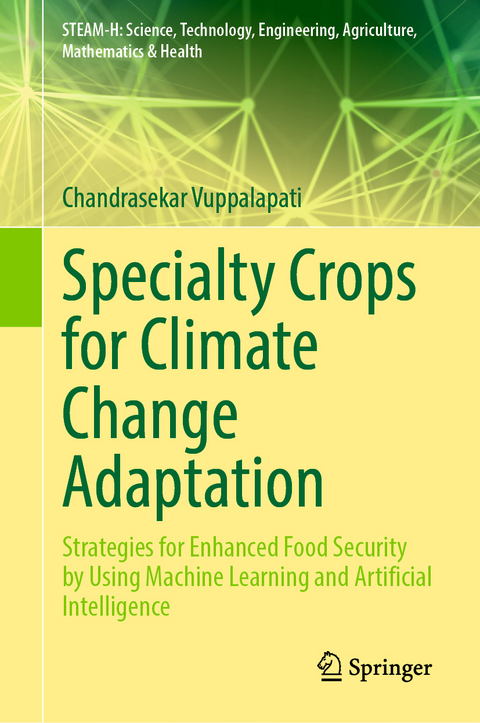
Specialty Crops for Climate Change Adaptation
Springer International Publishing (Verlag)
978-3-031-38398-4 (ISBN)
Specialty crops are defined as fruits and vegetables, tree nuts, dried fruits, horticulture, and nursery crops including floriculture. The value of specialty crop production in the United States accounted for 18.44 % of the $433.569 billion in agriculture cash receipts collected in 2021. In 2020, that ratio was 21.47% of the $363.464 billion. Specialty crops are gaining increasing attention across nation as demonstrated in the 2018 farm bill (Agricultural Act of the 2018 Farm Bill (P.L. 115-334)) with the increased number of provisions addressing specialty crop issues, reflecting their growing role in the global economy.
The cultivation of Specialty crops, nevertheless, has its own challenges. Specialty crops are generally more sensitive to climatic stressors and require more comprehensive management compared to traditional row crops. Specialty crops face significant financial risks threatening US$1.6 Trillion global market due to their higher water demand.
The mission of the book is to prepare current and future software engineering teams, agriculture students, economists, macroeconomists with the skills and tools to fully utilize advanced data science, artificial intelligence, climate patterns, and economic models to develop software capabilities that help to achieve Specialty crops and economic sustainability, through improved productivity for years to come and ensure enough food for the future of the planet and generations to come!
lt;p>Chandrasekar Vuppalapati is a seasoned Software IT Executive with diverse experience in software technologies, enterprise software architectures, cloud computing, big data business analytics, internet of things (IoT), and software product and program management. He has held engineering and product leadership positions at Microsoft, GE Healthcare, Cisco Systems, St. Jude Medical, and Lucent Technologies. Chandrasekar currently teaches software engineering, large-scale analytics, data science, mobile computing, cloud technologies, and web and data mining at San Jose State University (USA).
Chapter 1. Introduction.- Chapter 2. Specialty Crops.- Chapter 3. Time Series Data.- Chapter 4. Climate Models.- Chapter 5. Supervised Models.- Chapter 6. Unsupervised Models.- Chapter 7. Heuristic & Constraint Optimization.- Chapter 8. Deep Learning.- Chapter 9. Dimensionality Reduction.- Chapter 10. Ethical AI.- Chapter 11. Final Thought.
| Erscheinungsdatum | 17.10.2023 |
|---|---|
| Reihe/Serie | STEAM-H: Science, Technology, Engineering, Agriculture, Mathematics & Health |
| Zusatzinfo | XXXI, 813 p. 811 illus., 557 illus. in color. |
| Verlagsort | Cham |
| Sprache | englisch |
| Maße | 155 x 235 mm |
| Gewicht | 1375 g |
| Themenwelt | Informatik ► Theorie / Studium ► Künstliche Intelligenz / Robotik |
| Technik ► Lebensmitteltechnologie | |
| Weitere Fachgebiete ► Land- / Forstwirtschaft / Fischerei | |
| Schlagworte | adaptation strategies • Agricultural Economics • Artificial Intelligence • climate change • food security • machine learning • Specialty Crops |
| ISBN-10 | 3-031-38398-2 / 3031383982 |
| ISBN-13 | 978-3-031-38398-4 / 9783031383984 |
| Zustand | Neuware |
| Haben Sie eine Frage zum Produkt? |
aus dem Bereich


